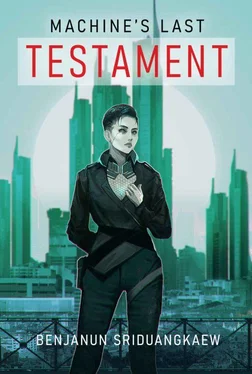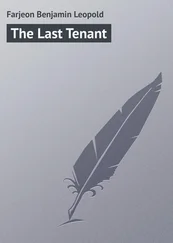“I’m sure you wouldn’t.” The mooncake is served, cut in thin slices. She samples one. Velvety filling—pandan custard and lotus seed, mixed just right—and hot enough to scald going down.
“And I didn’t mean to sour things between us.”
“The mooncake’s fantastic.” A connection request from Ovuha, which doesn’t seem like her. Nevertheless Suzhen appreciates the rescue. “I’ve got to take this call. It’s work. Do you mind?”
“Of course not.”
The link opens. Ovuha is home and her tracker reports nothing alarming: this is no exigency. Suzhen relaxes. Yes, Ovuha? How was Taheen’s?
It was fine. Would you tune into the news? Humor me. Channel ten.
Suzhen does. The feed flickers on, peripheral; channel ten is reserved for minor incidents, low on priority. It is reporting on an event barely hours old— Rachel Luo, a potentiate from Wyomere… providing therapeutic service…
The details fall away; they don’t matter. What matters—what does not recede—is the body on the floor of what might be someone’s apartment, an icy floor the color of snowdrift. Pieces of background detail: the hem of a curtain or upholstery, the leg of a chair or table. Pastel. Slowly being overwhelmed by the foreground.
Yellow hair on marble tiles, blood seeping between, saturating the ground like paint on canvas.
She’s on a call with the caseworker assigned to Rachel Luo. A senior agent, careerist like Nattharat, the sort that doesn’t burn out. Did he know Rachel Luo was signing up to provide therapeutic service? “It’s legal,” he says. “Potentiates finding a job isn’t something I was going to get in the way of. Listen, Rachel was troubled. He had too many dependents—the wife is a mess, the children are sick most of the time, none of them could learn or get certified for anything. How they weren’t separated and all the kids fostered is anyone’s guess. Agent Suzhen, I’m taking your call as a courtesy, but you’re interrogating me.”
Therapeutic service. The terminology of elision. “I appreciate that, yes—”
“I’ve got a lot of other inquiries to field. And I will need to inform Rachel’s family.” He grimaces. Sighs. “So if you don’t mind.”
He ends the call. Suzhen rubs her eyes as the feed fades, leaving her alone in her bedroom. Her mouth is sour and thick, her pulse hammering against the thin sheath of her larynx. A potentiate dying is not new. By definition their mortality rate is higher, their existence more prone to sudden accident. Suicide is not easy but possible, there being no guidance to prevent it. Murder likewise, when both perpetrator and victim are potentiates.
She thumbs the door open; Ovuha stands behind it, hand lifted halfway to knock. “How are you feeling, officer?”
Said in the calmest voice as if Suzhen is the wracked patient, Ovuha the detached caregiver. The balance between them inverts. Suzhen presses her lips together. “I’m fine. My colleague wasn’t too helpful.” She exhales through her teeth. “He said it was an accident. That Rachel Luo’s client didn’t mean to go that far.” A slip of the knife, a shock turned up too far, the therapy of controlled violence. Not always sexual, though it can be, an approved method for a citizen to vent destructive impulses on a human body. More satisfying, the effects more lasting, than anything virtual could ever be. Not all citizens need it, but enough do, and is it not productive to give potentiates a legal venue to work—
Her gorge surges, acute, acidic. The guidance is supposed to prevent this, stop it long before anything fatal can occur. It is almost prescient in its anticipation of human impulse.
“How well did you know him?” she says, for lack of any other conversation. Or a bid to right the balance, to leave Ovuha as stricken as she, as wounded.
“In passing. His children didn’t particularly like me—not their fault, I’m terrible around children—and his wife was wary of strangers.” Ovuha folds her hands over her belly. “Is it possible for me to go back to the Jasmine? There’s something I would like to retrieve.”
“I thought you’d already gotten—” Not Ovuha’s belongings, which have all burnt, but the bird gifted to her by Rachel Luo. “Hardly the most sensible idea.”
“I won’t disagree.”
Not even a protest. Suzhen motions at her vanity seat. “There’s no reason you should be on your feet. I’ll look into how accessible the Jasmine is, whether I can authenticate you.”
She watches Ovuha take in the bedroom and realizes, with leaden terror, that she has never let anyone into her bedroom for a long time; there was a reason she slept with Vipada at the actor’s place, and every tryst with Taheen happens at their gallery. Her room is too personal, too close. Ovuha’s presence is suddenly claustrophobic.
“What,” Ovuha says slowly, “does the therapeutic service entails?”
“You already know.”
“I can infer.” Ovuha turns in the seat, gaze passing over the small wardrobe and its neat arrangement of cosmetics: the pigments in their frosted jars, the shade adjusters in their steel palettes, the nacreous dermal overlays in their refrigerated compartment. “It must make a certain sense. Rachel tried to find other work before and never could.”
“It’s prescribed for citizens in calibration who need it, like any medicine. The rules for it are strict. Nobody wants anyone dead.”
“The imperative that informs every human choice needs to be curbed or given a safe outlet. I understand. And I’m sure those who provide this are honored. May I ask whether you’ve ever availed yourself of such a service?”
“No,” Suzhen snaps. “That’s a very personal question.”
“Yes. But I wondered. You’re flawlessly kind otherwise. Do you not resent me for taking up the space I do, for living off you, for gobbling up your time and strength like a leech? To you I’m not an intangible statistic which appeals to your charity. I am a physical body that takes and takes while giving nothing in return.”
“What are you trying to provoke me into?”
Ovuha stiffens. Her expression creases, as if a lapse of judgment is like a bad dream from which she must fight to wake up. “Nothing. Or I don’t know, or I can’t say. It’s childish and I have no right to behave so poorly. I expect many people are unfair to you, exactly because you’re a saint, and I shouldn’t be one more. And I think—” She shakes not her head but her entire upper body, the way an animal might, the way a hawk could. “It does not matter what I think.”
The charge between them of things unsaid and the weight of their histories, and Suzhen imagines blurting out, I was a potentiate once but the words curdle on her tongue. She wants . It would be a bridge. She shakes off the seafoam sheet in her lap and in a few strides she is standing over Ovuha. Leaning over, thinking that she wants, but what does she want precisely. A displacement of frustration and of course she has not failed to notice, from the beginning, Ovuha’s looks. The engineered symmetry, the artificed magnetism. A person designed from conception for beauty. It is the wrong thing to think, even to consider. What is between them must be a bureaucratic boundary, changeless and unyielding.
Ovuha is looking up at her, face in Suzhen’s shadow, and her expression is not the fear that Suzhen thought she’d see—the fear that finally her caseworker is not so virtuous, has given in to impulses as base as any camp warden’s. “You asked me what I want from my life here.” Ovuha has laid her hand on Suzhen’s arm, light as spider feet. “I’ve been curious as to what you want.”
Читать дальше












